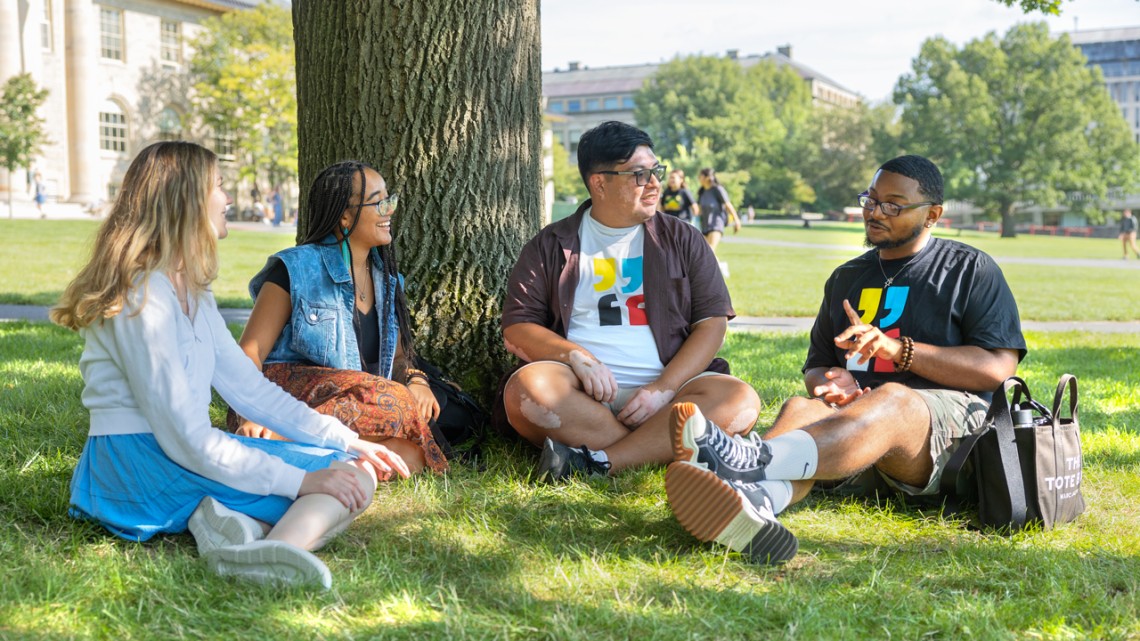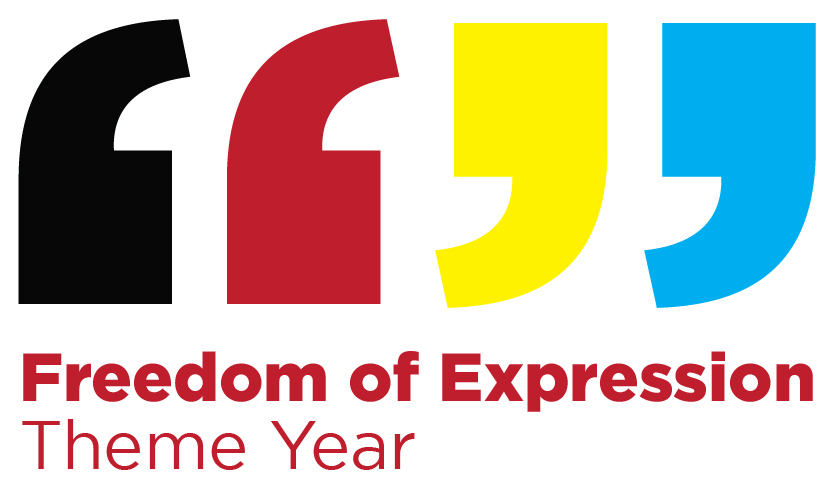
Students have a discussion on campus.
Theme year kickoff to explore free expression fundamentals
By James Dean, Cornell Chronicle
Cornell legal experts will review the fundamentals of free expression during a Sept. 7 panel discussion kicking off “The Indispensable Condition: Freedom of Expression at Cornell,” the university’s theme year focused on freedom of expression and academic freedom.
Their conversation – from 6 p.m. to 7:30 p.m. in Landis Auditorium at Cornell Law School’s Myron Taylor Hall, and viewable via livestream – will delve into the foundations of First Amendment protections for speech and assembly; challenges in applying those protections in a democratic and pluralistic society; and the ways speech principles play out in a rapidly changing digital world.
President Martha E. Pollack, who announced plans for the theme year in April and is an original member of a nationwide free-expression initiative including more than a dozen higher-education institutions, will offer introductory remarks. In an Aug. 24 welcome message to the campus community, Pollack called free expression and academic freedom essential to the university’s academic mission of discovering and disseminating new knowledge and educating the next generation of global citizens.
“They are key to our ability to equip our students with the skills needed for effective participation in democracy: from active listening and engaging across difference, to leading controversial discussions and pursuing effective advocacy,” Pollack wrote. “Ultimately, free expression and academic freedom are essential to our democracy: to the ability of each citizen to freely speak and learn, and to make informed decisions about their own life and future.”
The Sept. 7 panel features Michael C. Dorf, the Robert S. Stevens Professor of Law at Cornell Law, a constitutional law scholar; Karen Levy, associate professor of information science in the Cornell Ann S. Bowers College of Computing and Information Science and associate member of the Cornell Law faculty, who researches how law and technology interact to regulate social life; and Nelson Tebbe, the Jane M.G. Foster Professor of Law at Cornell Law, a First Amendment expert. The event will conclude with a Q&A session.
“For people who don’t have a lot of experience with these issues, or who just want to learn more, it’s crucial that we provide some grounding in the legal doctrine and how it applies in the context of a university,” said Gautam Hans, associate clinical professor of law at Cornell Law, who will facilitate the discussion. “We want to make sure everyone feels included.”
The universitywide theme year aims to build understanding and foster discussion around freedom of expression through a wide range of scholarly and creative events spanning disciplines and media – from conversations among invited speakers to music, poetry, film, fashion and lectures that explore different perspectives on free expression.
The theme’s reach even extends to ice cream. The College of Agriculture and Life Sciences’ food science “ice cream class,” in partnership with the Cornell Dairy Bar, will create new ice cream flavors celebrating freedom of expression. Cornell students will have the chance to vote for their favorite, to be available in the spring.
A newly launched theme year website shares background including the university’s core values, campus resources and a list of upcoming events, including:
- Sept. 12, 5-6:30 p.m.: The 2023 Daniel W. Kops Freedom of the Press Lecture featuring New York Times columnist Jamelle Bouie, who will discuss “Constitutionalism, Reform and the Press’s Role in Helping the Public Think About Institutions.” The lecture will take place in Rhodes-Rawlings Auditorium in Klarman Hall and be streamed here. The Kops Freedom of the Press Lecture is hosted by the American Studies Program in the College of Arts and Sciences.
- Sept. 23, 7 p.m.: A performance of “Scalia/Ginsburg,” a one-act comedic opera about the unlikely friendship between U.S. Supreme Court Justices Ruth Bader Ginsburg ’54 and Antonin Scalia, in the Memorial Room of Willard Straight Hall, presented by the Cornell Jeb E. Brooks School of Public Policy.
- Sept. 26, 5:30-7 p.m.: The inaugural Milstein Symposium – the first in a series throughout the theme year – featuring a conversation between Jameel Jaffer, executive director of the Knight First Amendment Institute at Columbia University and a leading thinker and litigator on free speech issues; and Eugene Volokh, the Gary T. Schwartz Distinguished Professor of Law at the UCLA School of Law, one of the nation’s leading First Amendment theorists. Dean of Faculty Eve De Rosa will moderate the discussion exploring the scope and boundaries of freedom of expression through a First Amendment lens, presented by the Howard and Abby Milstein Foundation and hosted by Cornell Law School in Landis Auditorium, 184 Myron Taylor Hall. The event will be recorded and made available on the theme year website.
Diverse programming – including events hosted by individual colleges and schools in both Ithaca and New York City – aims to encourage thought about freedom of expression beyond just the legal and policy realms, said Hans, who is also associate director of the Law School’s First Amendment Clinic.
“This is a huge topic and a complicated one,” Hans said. “We’re being very capacious to try to explore freedom of expression from many different social, cultural and analytic angles.”
Media Contact
Get Cornell news delivered right to your inbox.
Subscribe

